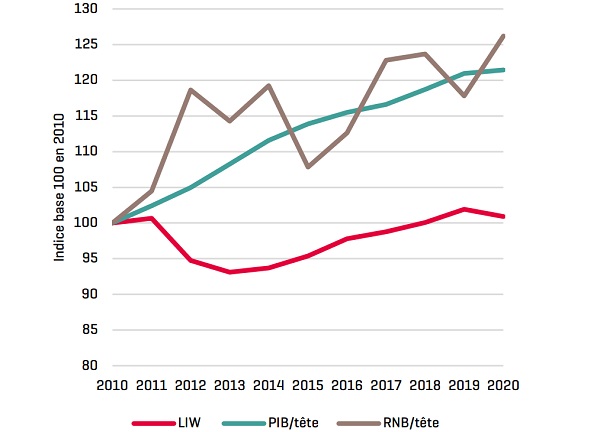 Well-being in Luxembourg does not follow the same trajectory as economic growth, according to STATEC's LIW;
Credit: STATEC
Well-being in Luxembourg does not follow the same trajectory as economic growth, according to STATEC's LIW;
Credit: STATEC
According to STATEC's Luxembourg Index of Well-being (LIW), the COVID-19 crisis did not noticeably affect the well-being of residents of the Grand Duchy in 2020.
This LIW indicator summarising well-being in Luxembourg has been stable since 2018. In 2020, the pandemic did not affect the well-being of residents; STATEC attributed this to stability of inequality and poverty indicators.
In 2021, STATEC indicators on subjective well-being showed a decrease in feelings of loneliness and anxiety between the start of the year and summer. Average ratings (on a scale of 0 to 10) for "satisfaction" (6.4 in January 2021, 6.9 in July 2021) as well as those for "happiness" (5.9 in January 2021, 6.5 in July 2021) have clearly increased.
The LIW covers aspects of well-being such as inequalities, health, work, education, work-life balance, environment, physical safety and relationships with family or friends. This indicator complements the traditional indicators of wealth defined around Gross Domestic Product (GDP) and Gross National Income (GNI).
2020
Between 2010 and 2020, GDP per capita grew by 21.5%. Whilst GNI per capita derived from the GDP had a more difficult trajectory, it was also on the rise, increasing by 26% in 2020 compared to 2010. Alongside these two indicators of national wealth, the well-being of residents, as measured by the LIW, only increased by 1% during the same period. The gap between the three indicators has widened since 2012 and, although the LIW rose again after a drop in 2011, its curve has stabilised since 2018 and tends to stagnate.
After having deteriorated over the past decade, the well-being of Luxembourg residents returned to its 2010 level last year. Some areas of well-being have suffered more than others, for instance the field of employment has deteriorated, as have those of education, housing and social ties. Conversely, the most marked improvement was observed in the area of the environment and, to a lesser extent, in the area of governance and citizenship as well as work-life balance.
According to STATEC, the various measures taken during the COVID-19 crisis seem to have made it possible to prevent a deterioration in the standard of living of households and individuals in Luxembourg. The stability of the inequality and poverty indicators confirm this.
When residents were asked to rate their life satisfaction in 2020 on a scale of 0 to 10, the average a score was 7.6 with a median of 8.0. These figures are identical to those for 2019.
2021
In order to regularly capture the well-being of residents, STATEC has been collecting data on the subjective well-being of people on a quarterly basis since January 2021.








